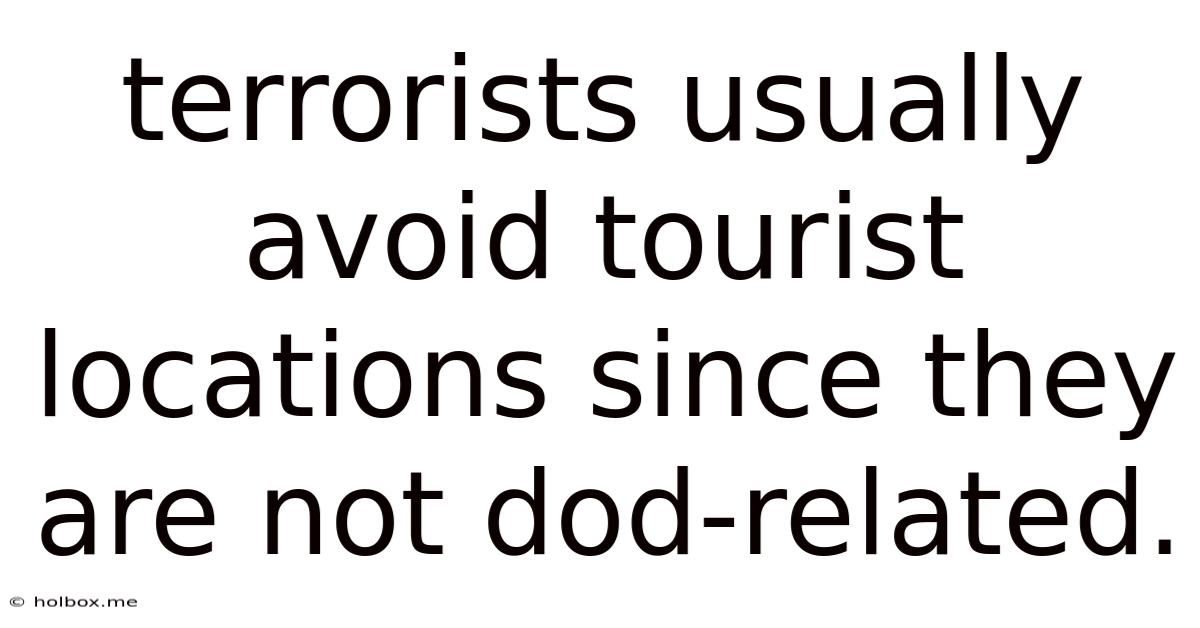Terrorists Usually Avoid Tourist Locations Since They Are Not Dod-related.
Holbox
May 08, 2025 · 4 min read

Table of Contents
Terrorist Tactics and the Avoidance of Tourist Locations: A Deeper Dive
The assertion that terrorists generally avoid tourist locations because they are not Department of Defense (DoD)-related requires significant nuance and a deeper examination of terrorist motivations, strategies, and target selection. While it's true that many terrorist attacks do target government buildings, military installations, and other symbols of state power, the notion that tourist sites are entirely off-limits is a dangerous oversimplification. The reality is far more complex.
Understanding Terrorist Motivations:
Before diving into the specifics of target selection, it's crucial to understand the driving forces behind terrorist acts. Terrorism, at its core, is a tactic used to achieve political, ideological, or religious goals through violence and intimidation. Different terrorist groups have different agendas, but common motivations include:
- Propaganda and Publicity: Terrorist attacks, particularly those targeting high-profile locations, aim to maximize media coverage and spread their message globally. The scale of the impact, the number of casualties, and the global attention garnered all feed into the group’s propaganda efforts.
- Instilling Fear and Destabilization: The goal is often to create widespread fear and panic, undermining public confidence in the government and security forces. This can lead to social unrest, political instability, and potentially, concessions from the targeted government.
- Demonstrating Capabilities: Some attacks serve to demonstrate the group's military capabilities, resources, and reach. This is especially true for groups vying for dominance within a larger terrorist network.
- Retaliation or Revenge: Attacks may be motivated by a desire for revenge for perceived injustices or as retaliation for specific actions taken by the government or other entities.
Target Selection: A Strategic Calculation:
Terrorist groups carefully consider various factors when selecting targets, including:
- Symbolic Value: Targets with high symbolic significance, representing government authority, military power, or economic strength, are often prioritized. This symbolic impact amplifies the message and impact of the attack.
- Vulnerability: Terrorist groups aim to maximize casualties and the overall impact of the attack. This leads them to consider the security measures in place, the potential for large gatherings of people, and the ease of access to the location.
- Media Attention: The potential for extensive media coverage is a key factor. High-profile targets, such as tourist attractions or major events, are more likely to attract significant global media attention, enhancing the propaganda value of the attack.
- Operational Feasibility: The practical aspects of carrying out the attack – including logistical challenges, the resources required, and the risk of apprehension – are also carefully weighed.
The Case of Tourist Locations:
While the assertion that tourist sites are inherently “non-DoD-related” is true, it’s an oversimplification that ignores the strategic value these locations can hold for terrorist groups. The reality is that terrorist organizations sometimes do target tourist locations:
- Maximum Casualties: Tourist locations often attract large crowds of people from diverse backgrounds, making them potentially lucrative targets for maximizing the number of casualties.
- Global Impact: An attack on a globally renowned tourist site will generate significant international media coverage, projecting the terrorist group's message to a wider audience than a more localized attack might.
- Economic Disruption: Attacks on tourism can significantly damage a region's economy, impacting businesses, jobs, and the local community. This economic disruption can add pressure on the targeted government.
- Psychological Impact: The targeting of seemingly safe and carefree spaces like tourist attractions can cause significant psychological trauma and fear, further destabilizing the region and the general population.
Examples of Attacks on Tourist Locations:
Numerous examples throughout history demonstrate that terrorist groups are not averse to targeting tourist locations. While specific motivations vary between groups, the overall strategy often involves maximizing media coverage and instilling fear. However, it's important to note that attacks on tourist locations often occur in specific contexts and are not random acts of violence.
Why the Misconception Persists:
The idea that terrorists avoid tourist locations likely stems from a number of factors:
- Focus on High-Value Targets: Much of the public discourse on terrorism centers on attacks against government buildings, military installations, and other symbols of state power. This understandably leads to a skewed perception of terrorist target selection.
- Security Measures: Increased security measures at many tourist locations make them harder targets, potentially deterring some attacks. However, this doesn't eliminate the risk entirely.
- Public Perception: The perceived safety of tourist locations can lead to a degree of complacency, making it easier for the public to dismiss the possibility of an attack.
Conclusion:
In conclusion, the statement that terrorists avoid tourist locations because they are not DoD-related is a gross oversimplification and a dangerous misconception. While terrorist groups certainly prioritize targets with significant symbolic value, operational feasibility, and media impact, tourist locations can tick all of these boxes. The choice of targets is a strategic calculation, carefully weighed against the potential for casualties, media attention, and the overall impact on the targeted government and population. Ignoring this reality can lead to complacency and hinder effective security measures. A more thorough understanding of terrorist motivations, strategies, and target selection processes is essential for developing effective counter-terrorism strategies and ensuring the safety and security of both citizens and tourists alike. The notion that tourist sites are immune to terrorist attacks is not just inaccurate, it’s potentially fatal.
Latest Posts
Related Post
Thank you for visiting our website which covers about Terrorists Usually Avoid Tourist Locations Since They Are Not Dod-related. . We hope the information provided has been useful to you. Feel free to contact us if you have any questions or need further assistance. See you next time and don't miss to bookmark.